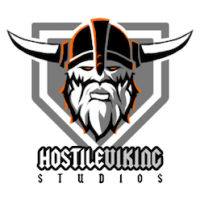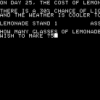<inexperienced opinion>
<not a lawyer>
He's making it for "free", but then charging your royalties for the rest of the game's life? Maybe it's just me, but I don't consider "free" to include perpetual monthly payments.
Anytime a game is ever sold using that music, even twenty years later, you have to track down and make sure he gets his currently-unspecified cut? Even if it was just 5 cents, that'd be a huge irritation for me.
Now if it was time-limited - e.g. he gets 5% for only the first 6 months, or only the first year of release, but you keeping the ability to continue selling the music afterward, that'd be less absurd in my mind.
Whatever percentage is it, and you best doubly be sure it's percentage of profit you make, or percentage of your cut of the revenue, and not percentage of gross store sticker price revenue. You'd already be paying Steam, Apple, or whatever other store a cut (standard is 30%). You'll already give Kickstarter a percentage if you do that. You don't want to give him a cut of store price, but of your personal revenue, or better still, your personal profit after other expenses.
And what happens if you don't like the music he produces? Are you now obligated to give him a cut even if you don't use the music and even if his music is junk? Will the contract be, 'I slap together whatever music I want overnight, and now you are obligated to give me a percentage of your years of work'?
What if he only produces half the music needed for the game, and someone else produces the other half? Do you owe both of them a percentage now?
If you make a mistake, but paid cash, you lose that (potentially large amount of) cash but can move on. It's a one-time cost of learning. If you make a mistake, but sign over part of your revenue, you can't move on from that - a contract is a contract.
What if you make a sequel - can you no longer use the original game's now-popular music and theme songs, and is the composer now in a position to charge you exploitive prices because you are desperate to re-use the popular theme songs your players are now attached to?
What if you make a sequel - is the contract vague enough that even if you use entirely new music, the composer is going to try to come after you for a cut of the sequel's revenue? There's money there, and so a motive exists for him to try.
What if you release DLC... does the composer get a cut of every piece of DLC, even if the extra DLC doesn't specifically include any new music?
I'm not accusing the person of trying to exploit you. Rather, I think he's just winging it as much as you are. But when the legal dust settles, he may accidentally find that he is now in a position to exploit you, and with a real motive to do so. The more successful your game is, the greater the temptation.
Business is messy. 
If you can't hire a lawyer (which I'm assuming is the case, since you can't hire a composer. I can relate!), then don't try to make a legalese-sounding document, because (apparently) if you make a mistake in legalese, any judge has to rule according to what the legalese says exactly. But if you make it in plain english, perhaps with bullet points, and formatting and such, then the judge is free to interpret it according to what your intent was, even if you make a mistake in wording.
Best of luck on your game!
</not a lawyer>
</inexperienced opinion>









